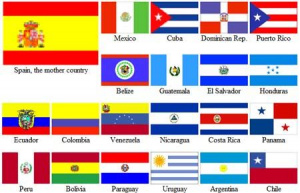Language/Spanish/Grammar/Present-Tense-Verbs
 Հայերէն
Հայերէն Български език
Български език 官话
官话 官話
官話 Hrvatski jezik
Hrvatski jezik Český jazyk
Český jazyk Nederlands
Nederlands English
English Suomen kieli
Suomen kieli Français
Français Deutsch
Deutsch עברית
עברית हिन्दी
हिन्दी Magyar
Magyar Bahasa Indonesia
Bahasa Indonesia فارسی
فارسی Italiano
Italiano 日本語
日本語 Қазақ тілі
Қазақ тілі 한국어
한국어 Lietuvių kalba
Lietuvių kalba Νέα Ελληνικά
Νέα Ελληνικά Şimali Azərbaycanlılar
Şimali Azərbaycanlılar Język polski
Język polski Português
Português Limba Română
Limba Română Русский язык
Русский язык Српски
Српски العربية القياسية
العربية القياسية Svenska
Svenska Wikang Tagalog
Wikang Tagalog தமிழ்
தமிழ் ภาษาไทย
ภาษาไทย Türkçe
Türkçe Українська мова
Українська мова Urdu
Urdu Tiếng Việt
Tiếng Việt
| ◀️ Subject Pronouns — Previous Lesson | Next Lesson — Ser and Estar ▶️ |
Introduction[edit | edit source]
Welcome to the lesson on present tense verbs in Spanish! In this lesson, you will learn how to conjugate regular, irregular, and stem-changing verbs in the present tense. Mastering the present tense is essential for effective communication in Spanish, as it is used to talk about actions happening in the present moment. So, let's dive in and explore the fascinating world of Spanish verbs!
Regular Verbs[edit | edit source]
Regular verbs are the easiest to conjugate in the present tense. They follow a predictable pattern, making it simpler for learners to grasp the conjugation rules. In Spanish, regular verbs are classified into three categories based on their infinitive endings: -ar, -er, and -ir. Let's take a look at the conjugation patterns for each category.
-ar Verbs[edit | edit source]
Verbs that end in -ar are the most common type of regular verbs in Spanish. To conjugate them in the present tense, remove the -ar ending and add the appropriate endings based on the subject pronouns. Let's see some examples:
| Spanish | Pronunciation | English |
|---|---|---|
| hablar | [a-ˈblaɾ] | to speak |
| cantar | [kan-ˈtaɾ] | to sing |
| bailar | [ba-ˈlaɾ] | to dance |
Here's the conjugation of the verb "hablar" (to speak) in the present tense:
- Yo hablo - I speak
- Tú hablas - You speak (informal)
- Él/Ella/Usted habla - He/She/You(formal) speaks
- Nosotros/Nosotras hablamos - We speak
- Vosotros/Vosotras habláis - You all speak (informal, Spain)
- Ellos/Ellas/Ustedes hablan - They/You all speak
-er Verbs[edit | edit source]
Verbs that end in -er follow a similar conjugation pattern to -ar verbs. Let's take a look at some examples:
| Spanish | Pronunciation | English |
|---|---|---|
| comer | [ko-ˈmeɾ] | to eat |
| beber | [be-ˈbeɾ] | to drink |
| correr | [ko-ˈreɾ] | to run |
Here's the conjugation of the verb "comer" (to eat) in the present tense:
- Yo como - I eat
- Tú comes - You eat (informal)
- Él/Ella/Usted come - He/She/You(formal) eats
- Nosotros/Nosotras comemos - We eat
- Vosotros/Vosotras coméis - You all eat (informal, Spain)
- Ellos/Ellas/Ustedes comen - They/You all eat
-ir Verbs[edit | edit source]
The conjugation of -ir verbs is similar to that of -er verbs, with some minor differences. Let's see some examples:
| Spanish | Pronunciation | English |
|---|---|---|
| vivir | [bi-ˈbiɾ] | to live |
| escribir | [es-kɾi-ˈbiɾ] | to write |
| abrir | [a-ˈbɾiɾ] | to open |
Here's the conjugation of the verb "vivir" (to live) in the present tense:
- Yo vivo - I live
- Tú vives - You live (informal)
- Él/Ella/Usted vive - He/She/You(formal) lives
- Nosotros/Nosotras vivimos - We live
- Vosotros/Vosotras vivís - You all live (informal, Spain)
- Ellos/Ellas/Ustedes viven - They/You all live
Irregular Verbs[edit | edit source]
Irregular verbs in Spanish don't follow the regular conjugation patterns. Their conjugation forms must be memorized individually. In this section, we will explore some of the most common irregular verbs in the present tense.
Ser (to be)[edit | edit source]
The verb "ser" is used to talk about permanent attributes or characteristics. It is essential to master its conjugation since it is one of the most frequently used verbs in Spanish. Let's take a look at its conjugation:
| Spanish | Pronunciation | English |
|---|---|---|
| ser | [seɾ] | to be |
Here's the conjugation of the verb "ser" (to be) in the present tense:
- Yo soy - I am
- Tú eres - You are (informal)
- Él/Ella/Usted es - He/She/You(formal) is
- Nosotros/Nosotras somos - We are
- Vosotros/Vosotras sois - You all are (informal, Spain)
- Ellos/Ellas/Ustedes son - They/You all are
Estar (to be)[edit | edit source]
The verb "estar" is used to talk about temporary states or locations. Let's take a look at its conjugation:
| Spanish | Pronunciation | English |
|---|---|---|
| estar | [esˈtaɾ] | to be |
Here's the conjugation of the verb "estar" (to be) in the present tense:
- Yo estoy - I am
- Tú estás - You are (informal)
- Él/Ella/Usted está - He/She/You(formal) is
- Nosotros/Nosotras estamos - We are
- Vosotros/Vosotras estáis - You all are (informal, Spain)
- Ellos/Ellas/Ustedes están - They/You all are
Tener (to have)[edit | edit source]
The verb "tener" is used to talk about possession or age. Let's take a look at its conjugation:
| Spanish | Pronunciation | English |
|---|---|---|
| tener | [teˈneɾ] | to have |
Here's the conjugation of the verb "tener" (to have) in the present tense:
- Yo tengo - I have
- Tú tienes - You have (informal)
- Él/Ella/Usted tiene - He/She/You(formal) has
- Nosotros/Nosotras tenemos - We have
- Vosotros/Vosotras tenéis - You all have (informal, Spain)
- Ellos/Ellas/Ustedes tienen - They/You all have
Stem-Changing Verbs[edit | edit source]
Stem-changing verbs, also known as boot verbs, undergo changes in the stem vowel in all forms except for nosotros and vosotros. There are three types of stem changes: o→ue, e→ie, and e→i. Let's explore some examples of each type.
o→ue Verbs[edit | edit source]
In this type of stem change, the o in the stem changes to ue in all forms except for nosotros and vosotros. Let's take a look at some examples:
| Spanish | Pronunciation | English |
|---|---|---|
| poder | [po-ˈðeɾ] | to be able to |
| dormir | [doɾ-ˈmiɾ] | to sleep |
| contar | [kon-ˈtaɾ] | to count, to tell |
Here's the conjugation of the verb "poder" (to be able to) in the present tense:
- Yo puedo - I can
- Tú puedes - You can (informal)
- Él/Ella/Usted puede - He/She/You(formal) can
- Nosotros/Nosotras podemos - We can
- Vosotros/Vosotras podéis - You all can (informal, Spain)
- Ellos/Ellas/Ustedes pueden - They/You all can
e→ie Verbs[edit | edit source]
In this type of stem change, the e in the stem changes to ie in all forms except for nosotros and vosotros. Let's see some examples:
| Spanish | Pronunciation | English |
|---|---|---|
| querer | [ke-ˈɾeɾ] | to want, to love |
| cerrar | [θe-ˈɾaɾ] | to close |
| pensar | [pen-ˈsaɾ] | to think |
Here's the conjugation of the verb "querer" (to want, to love) in the present tense:
- Yo quiero - I want, I love
- Tú quieres - You want, You love (informal)
- Él/Ella/Usted quiere - He/She/You(formal) wants
- Nosotros/Nosotras queremos - We want, We love
- Vosotros/Vosotras queréis - You all want, You all love (informal, Spain)
- Ellos/Ellas/Ustedes quieren - They/You all want
e→i Verbs[edit | edit source]
In this type of stem change, the e in the stem changes to i in all forms except for nosotros and vosotros. Let's take a look at some examples:
| Spanish | Pronunciation | English |
|---|---|---|
| pedir | [pe-ˈðiɾ] | to ask for |
| repetir | [ɾe-pe-ˈtiɾ] | to repeat |
| seguir | [se-ˈɣiɾ] | to follow |
Here's the conjugation of the verb "pedir" (to ask for) in the present tense:
- Yo pido - I ask for
- Tú pides - You ask for (informal)
- Él/Ella/Usted pide - He/She/You(formal) asks for
- Nosotros/Nosotras pedimos - We ask for
- Vosotros/Vosotras pedís - You all ask for (informal, Spain)
- Ellos/Ellas/Ustedes piden - They/You all ask for
Conclusion[edit | edit source]
Congratulations! You have successfully learned how to conjugate regular, irregular, and stem-changing verbs in the present tense. Verbs play a crucial role in any language, and mastering their conjugation is essential for effective communication. Keep practicing and expanding your vocabulary, and you'll be well on your way to becoming a fluent Spanish speaker. ¡Buena suerte! (Good luck!)
Videos[edit | edit source]
Spanish Present Tense | Basic Spanish 101 - YouTube[edit | edit source]
How to form Spanish Verbs in the Present Tense //AR //ER //IR ...[edit | edit source]
Spanish Present Tense of Verbs (ar, er, ir verbs) | Spanish Grammar ...[edit | edit source]
Spanish Verbs Conjugation in the present tense - YouTube[edit | edit source]
Learn Spanish Verbs and Tenses: Present Tense - YouTube[edit | edit source]
Sources[edit | edit source]
- Mastering the Spanish Present Tense: A Beginner's Guide | FluentU ...
- Present Tense in Spanish - Spanish Verb Conjugation Rules
- Regular verbs in the present tense - Spanish Grammar | Hotel ...
Other Lessons[edit | edit source]
- The Spanish Alphabet and Pronunciation
- The noun gender
- Be Polite
- El Verboide
- Plural
- Descriptive Adjectives
- Los pronombres personales
- 0 to A1 Course
- Direct Object Pronouns
- Questions
| ◀️ Subject Pronouns — Previous Lesson | Next Lesson — Ser and Estar ▶️ |


